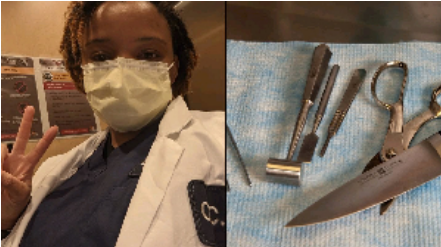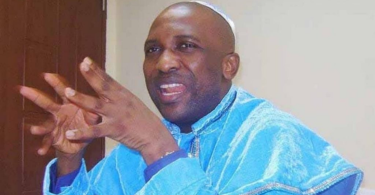Autopsy technician found a live snake inside dead person’s body
An autopsy technician in Maryland has explained why she loves working with dead bodies despite it not being the job she always dreamed of doing.
For many people, death is something to be avoided at all costs and only dealt with when necessary. For Jessika Logan, it’s her nine-to-five.
The 31-year-old began working as an autopsy technician nine years ago, after applying for an internship in the autopsy services department of the Medical Examiner’s office in Baltimore, Maryland.
Now, she’s opened up to LADbible about what she loves about the job, some of her wildest experiences at work, and whether she can see herself being an autopsy technician for the rest of her career.
While Jessika hadn’t always dreamed of delving into dead bodies, she long had the desire to be a medical examiner – the people who ‘provide independent scrutiny of the causes of death, according to the NHS.
When she was just four years old, Jessika used to sneak to the television to watch the X-Files and developed a fascination with medical examiner Agent Scully. She hoped to go to medical school and become a forensic pathologist and a medical examiner, but she was forced to withdraw following financial hardship.
Jessika began her internship in the autopsy services department when she was 21 and was officially hired just before her 23rd birthday. In her office, she was only required to have a high school diploma or GED, and be over 18. Otherwise, she could learn on the job.
Jessika has been working as an autopsy technician for nine years. Credit: Supplied
For Jessika, a ‘day in life at work is a lot more graphic than sitting at a desk or working on a computer. Once the medical examiner has finished their external examination of the deceased, then, as Jessika puts it, ‘the evisceration can begin’.
Not all of the bodies brought into the office receive a full autopsy, but for those that do, it’s an intense process. We won’t get too graphic, but this involves the autopsy tech cutting into the body, obtaining fluids for testing and removing the internal organs.
Jessika explained: “In some offices and most hospitals this is done by removing the organs individually or organ by organ. I was trained to remove all of the organs in one connected structure… So I like to disconnect the colon, bladder, and prostate on those that were assigned male at birth or disconnect the colon, bladder, uterus and ovaries on those that were assigned female at birth.
“Then I like the disconnect of the throat and tongue.”
It’s certainly not a job for everyone, and Jessika expressed the belief that being an autopsy technician is best suited to those who are ‘compassionate about people. She also noted that you ‘can’t be afraid of being challenged both physically and mentally, and, obviously, ‘you definitely can’t be afraid of the dead’.
The 31-year-old loves the job because it’s ‘always something different’ – evident in one instance when she discovered a live snake in a person’s thigh.
Jessika loves her job because it’s ‘always different. Credit: Supplied
Staff naturally had no idea the creature was lying in wait until they were about to start the autopsy, and Jessika admitted that ‘saying [she] freaked out would be an understatement.
“I ran across the room screaming and wouldn’t return until the creature was secured,” she recalled.
The snake is thought to have slithered into the body following the death of the person, who was ‘severely decomposed and found in a creek’.
Dealing with severely decomposed people is the more stomach-churning work for Jessika, who explained she is ‘not a fan of these cases. Though she will of course always do her job, severely decomposed bodies can mean there are bugs involved.
“It depends on the conditions the deceased are found in,” she explained. “If it is dry and cool there usually isn’t a lot of insect activity. But if it is hot and damp there are usually a lot of bugs. I prefer decomposed cases in the wintertime.”
The bugs can be found both in and outside the body, but unfortunately, there’s no easy way to get rid of them. As a result, the staff ‘just have to work around them.
Jessika’s friends all ‘love hearing about her work stories, though her family is understandable ‘still slightly freaked out if she launches into in-depth discussions.
Looking ahead, Jessika might not stay in the physically taxing job forever, but she’s confident she wants to continue a career in death care and has hopes that she can ‘help people find closure when dealing with one of the hardest things they will ever have to experience.












